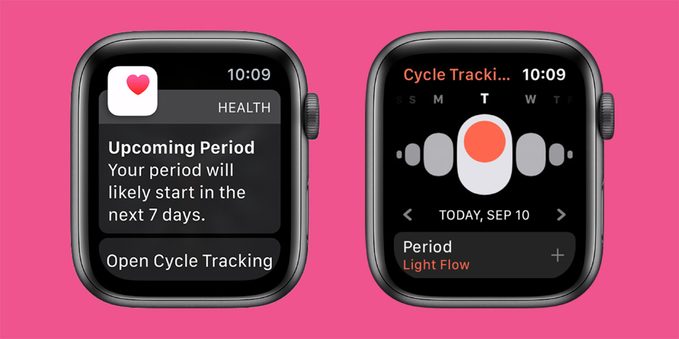Why You Should Be Tracking Your Menstrual Cycle

Apple has launched a Cycle Tracking app—and unlike other (free) apps of the same genre, it does so much more than just record the dates of your period. Here, two doctors share the ways keeping a cycle log can improve your overall health.
For women trying to conceive or keep track of an irregular period, menstrual cycle apps have become an imperative tool. They can highlight ovulation days and suggest a concern that should be brought up to a doctor. But, few period apps have offered anything more than that—aside from community chatrooms, oral sex tips and guided meditations on “visualizing fertility”—until now.
Apple’s new Cycle Tracking app, available through the Apple Health app with iOS 13 and on the Apple watchOS 6, is a bit of a game-changer. Compared to other period apps, it provides a more pleasant experience for women to keep track of their periods. There are no pop-up ads or fear-mongering quirks (ie. Warning signs that “your period is late by 48 days!”). Like other period apps, it features a calendar that uses the data you’ve entered to predict the date of your next period. But because it collects more data than other apps, it’s more accurate. What’s more, Apple’s app also offers a log section where you can enter PMS symptoms and anything else that may be going on down there. Why is it important to note these details? So any abnormalities or other issues with your cycle can be conveniently and accurately relayed to your doctor and you can get the help you may not have known you needed.

Should you be keeping a period diary? What information should you record? We reached out to two doctors—Jennifer Blake, MD, an obstetrician-gynecologist in Toronto and CEO of the Society of Obstetricians and Gynecologists of Canada, and Édith Guilbert, MD, medical advisor in Quebec City—to find out.
1. Who should consider tracking their menstrual cycle?
Dr. Blake and Dr. Guilbert agree all women should track their cycle. In particular, women who are sexually active should be recording their periods to ensure they aren’t pregnant if they do not wish to be, says Dr. Guilbert. Those who have an irregular period and those in their forties and premenopausal would also benefit from tracking their cycle, says Dr. Blake.
2. Why is it important to track an irregular period?
Women should track their menstrual cycle “to make sure that they are in good health and do not have hormonal problems,” says Dr. Blake. Recording the dates of your period over the course of a few months could help your doctor identify the cause of the irregularity.
3. What can you learn from recording statistics about our menstrual cycle, such as typical period length or typical cycle length?
A healthy period length is 3–8 days, and a healthy cycle length is 21–25 days, says Dr. Guilbert. If your menstrual cycle falls outside of the average, it could indicate that you’re not ovulating regularly, you have a hormone imbalance, or you have another underlying health concern, says Dr. Blake.
4. What other details of your cycle should you log?
- The heaviness or lightness of a period: This is useful to collect because it may be linked to hormonal or structural problems, says Dr. Guilbert. “Or it may be side effects of a contraceptive method: for example, women using a Copper IUD may have heavier periods while women using a hormonal IUD will have lighter periods.”
- PMS symptoms: Many women don’t realize if you keep a diary of your symptoms, your doctor can help alleviate them, says Dr. Blake. A symptom diary can identify your typical pattern of PMS and also help to determine the type of PMS symptoms you’re experiencing.
- Spotting: If you’re sexually active, you should be tracking any spotting you’re experiencing. “It may be a sign of genital infection, abnormal pregnancy, abnormalities inside the uterus or a side effect of hormonal contraception,” says Dr. Guilbert.
- Ovulation test results: Recording your ovulation test results can help you time your ovulation, so you know when you have the greatest chance of conceiving, says Dr. Blake.
- Cervical mucus quality: Take note of cervical mucus if you are using it to plan your pregnancy, says Dr. Blake. It’s also a good idea to record any abnormalities if you’re sexually active, to ensure you haven’t contracted an STD.
- Basal body temperature: If you’re trying to conceive, recording your basal body temperature will help you determine the days you have the highest chances of conceiving, says Dr. Blake.
5. Can any of this logging be used to identify any possible reproductive challenges, illnesses, diseases, or any other concerns?
“Absolutely—it is essential for those doing natural family planning and those who want to conceive a baby,” says Dr. Guilbert. “It may help identify hormonal problems and gynecological anomalies.”
6. Is there anything else you should consider logging on the app?
Consider recording any unusual symptoms, says Dr. Guilbert. “Record the location (ex.: pain), frequency (how many times a day), history (since when), duration (how many minutes, hours, weeks), intensity (on a scale of 1 to 10), association with other symptoms and signs, and what increases and lowers the symptom or sign,” she says. Be sure to consult your health professional to discuss the symptoms.
Next, learn about the company that makes it possible to get a prescription for lifestyle meds without a visit to your doctor.




